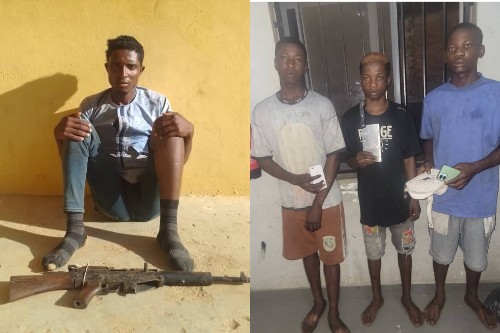The Gateway Stadium, Sagamu was aglow yesterday, the 27th of December, 2024, as the maiden edition of Remo Day culminated in a grand rally celebrating the unity, culture, and progress of Remoland. Hosted by the revered Akarigbo of Remoland, the event brought together dignitaries from across the nation, including the Chief of Staff to the President of Nigeria, Hon Femi Gbajabiamila, the esteemed Governor of Ogun State, Prince Dapo Abiodun (MFR) and the first lady of the state, The Ewusi of Makun, HRH Oba Timothy Oyesola Akinsanya, ORUNAGBA II, Chairman of Adron Group and Otun Akile of Remoland Aare Adetola Emmanuelking, amongst others.
Aare Adetola Emmanuelking’s presence stood out in class as he brought unparalleled style, sophistication, and charm to the occasion. Dubbed the ” Remo Day Man of Steeze,” Aare Adetola made an unforgettable entrance, draped in an exquisite wine agbada adorned with intricate embroidery, accessorized with traditional coral beads, and crowned with a regal fila. His look, a masterclass in cultural elegance, radiated confidence and pride in Yoruba heritage, instantly earning him admiration from the gathered audience. Known for his charisma and commitment to the development of Remoland, Aare Adetola was the epitome of poise and grandeur as he engaged with other top dignitaries and attendees. From his interactions to his overall demeanor, every aspect of his presence reflected a deep connection to his roots, and an unyielding passion for community growth.
Communities from across Remoland including Epe, Makun, Iperu, Irolu, Emuren, Ogere, Ikenne, Ilara, Ode remo, Isara, Ipara, Ilishan, Soyindo, Ijagba, Ado, Ode lemo, Ibido, Idena, Ogijo, Atayo, Eposo, Idado, Latawa, Oko, Ipoji, Lowa ibu, Igbepa, Ijoku, Iraye, Ilupeju, Iraniken, Okeselu, Simawa, Ilaye, Iraye, Agura, Igode, Sotubo, Ariye , Araromi, Imushin, Imeji, Agbehinsa , and many more, converged at the Gateway Stadium to pay homage to the Akarigbo of Remoland, a revered symbol of unity and cultural pride. This act of respect and solidarity emphasized the deep-rooted connection between the people and their traditional ruler as they celebrated the remarkable growth and development of Remo. Among the many groups, Iyaniwura Base stood out under the distinguished leadership of Aare Adetola Emmanuelking. Following in his illustrious footsteps, the group brought a splash of vibrance to the event, dazzling attendees with their matching cultural attires that reflected the rich traditions of Remoland. Their coordinated elegance and enthusiastic homage added a memorable touch to the grand celebration.
The Remo Day celebration, themed “In Unity & Culture, We Thrive,” was more than a cultural showcase. It was a celebration of the strength and progress of Remoland, featuring colorful displays of traditional dance, drumming, and artwork. Amid the festivity, Aare Adetola’s magnetic personality and gallant appearance was a true highlight of the day. The Grand Rally provided a perfect backdrop for celebrating individuals who embody the spirit of Remo’s advancement. In Aare Adetola Emmanuelking, Remo found a true cultural icon, someone who not only lives the values of the community, but also inspires others to embrace and promote its legacy with pride and dignity.
The Remo Day celebrations may have concluded, but the image of Aare Adetola, standing tall in his resplendent attire, remains etched in the memories of attendees. Aare Adetola Olaonipekun Emmanuelking- a name synonymous with grace, culture, and unshakable pride in Remoland’s illustrious heritage. Indeed, the “Remo Day Man of Steeze” has set a standard that will resonate far beyond Remoland.








 BIG STORY3 days ago
BIG STORY3 days ago
 BIG STORY3 days ago
BIG STORY3 days ago
 BIG STORY3 days ago
BIG STORY3 days ago
 BIG STORY2 days ago
BIG STORY2 days ago
 BIG STORY4 days ago
BIG STORY4 days ago
 BIG STORY3 days ago
BIG STORY3 days ago
 BIG STORY3 days ago
BIG STORY3 days ago
 BIG STORY1 day ago
BIG STORY1 day ago



















